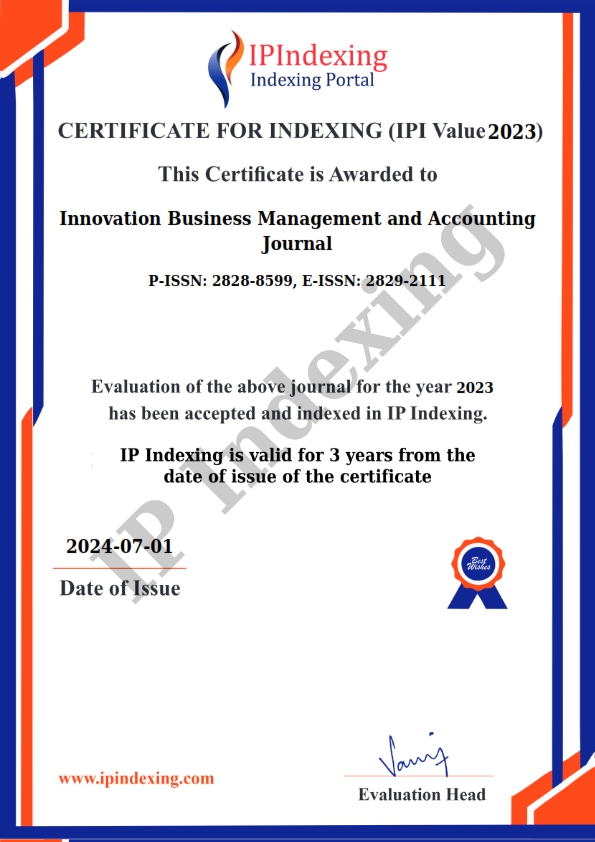Management Accounting Systems and Organizational Performance of Commercial Banks in Nepal
DOI:
https://doi.org/10.56070/ibmaj.2025.025Keywords:
Budgeting, Commersial Bank, Management Accounting System, Organizational PerformanceAbstract
This study investigates the profound influence of management accounting systems (MAS) on the organizational performance of commercial banks in Nepal. Drawing upon a quantitative research design with a sample of 385 employees from Kathmandu Valley’s commercial banks, the research explores how key MAS components, namely, controlling and reporting, budgeting, decision-making, costing systems, and performance evaluation, collectively impact various dimensions of organizational success. The findings reveal a generally positive perception among employees regarding the effectiveness of these practices. Correlation analysis indicates moderate positive relationships between all management accounting practices and organizational performance, with budgeting demonstrating the strongest association. Regression analysis further confirms that controlling and reporting, budgeting, costing systems, and performance evaluation practices exert a significant positive impact on organizational performance. However, decision-making practices were found to have an insignificant impact within this model. This study presents crucial theoretical and practical implications, emphasizing the need for Nepalese commercial banks to strengthen their management accounting frameworks to improve operational efficiency, strategic decision-making, and competitive positioning in a dynamic financial context.
Downloads
References
Adeniyi, B. C., & Fayigbe, G. S. (2024). Customer relationship management tools and organizational performance of commercial banks in Southwest, Nigeria. Malete Journal of Accounting and Finance, 4(2), 161–175.
Adhikara, A., MF, M., & Nur Diana, M. (2017). The implementation of management accounting practices and its relationship with performance in small and medium enterprises. International Review of Management and Marketing, 7(1), 342-353.
Alabdullah, T. T. Y. (2019). Management accounting and service companies' performance: Research in emerging economies. Australasian Accounting, Business and Finance Journal, 13(4), 100-118.
Al-dalaien, B. O. A., Khaled, A. S., Al-Homaidi, E. A., & Cunha, J. (2017). The implementation of an Activity-Based Costing (ABC) system in a manufacturing company. Procedia Manufacturing, 13(1), 932-939.
Al-Qudah, S., Obeidat, A. M., & Shrouf, H. (2020). The impact of strategic human resources planning on the organizational performance of public shareholding companies in Jordan. Problems and Perspectives in Management, 18(1), 219-220.commercial
Asiaei, K., Bontis, N., Alizadeh, R., & Yaghoubi, M. (2022). Green intellectual capital and environmental management accounting: Natural resource orchestration in favor of environmental performance. Business Strategy and the Environment, 31(1), 76-93.
Ayvaz, E., & Pehlivani, D. (2011). The use of time-driven activity-based costing and the analytic hierarchy process method in the balanced scorecard implementation. International Journal of Business and Management, 6(2), 146-158.
Baldvinsdottir, G., Mitchell, F., & Nørreklit, H. (2010). Issues in the relationship between theory and practice in management accounting. Management Accounting Research, 21(2), 79-82.
Campos, F., Lima Santos, L., Gomes, C., & Cardoso, L. (2022). Management Accounting Practices in the. (Note: Title is incomplete in the original source.)
Charifzadeh, M., & Taschner, A. (2017). Management accounting and control: Tools and concepts in a Central European context. John Wiley & Sons.
Fullerton, R. R., Kennedy, F. A., & Widener, S. K. (2013). Management accounting and control practices in a lean manufacturing environment. Accounting, Organizations and Society, 38(1), 50-71.
Fuzi, N. M., Habidin, N. F., Janudin, S. E., Yong, S., & Ong, Y. (2016). Environmental management accounting practices and environmental performance. [Journal unknown], 33(4), 663-691. (Note: Title and journal name are incomplete in the original source.)
Gnawali, A. (2018). Management accounting systems and organizational performance of Nepalese commercial banks. Journal of Nepalese Business Studies, 10(1), 8-19.
Gomes, C. F. (2020). Organizational performance management: Trends, challenges, and solutions. Emerging Topics in Management Studies, 2(1), 167-188.
Granlund, M. (2011). Extending AIS research to management accounting and control issues: A research note. International Journal of Accounting Information Systems, 12(1), 3-19.
Guilding, C., Lamminmaki, D., & Drury, C. (1998). Budgeting. [Journal unknown], 8-359. (Note: Title and journal name are incomplete/unclear in the original source.)
Hiebl, M. R., Gärtner, B., & Duller, C. (2017). Chief financial officer (CFO) characteristics and ERP system adoption: An upper-echelons perspective. Journal of Accounting & Organizational Change, 13(1), 85-111.
Mc-Lellan, J. D., & Sherine, F. A. A. (2013). Strategy and management accounting practices alignment and its effect on organizational performance. Journal of Accounting–Business & Management, 20(1), 1-27.
Mensah, A., Ruby, R., Osei, D., Bashiru, A. W. A., & Opoku, O. A. (2024). Assessing The Effect of. (Note: Title is incomplete in the source.)
Mohamad, S. H., Othman, N. A., Jabar, J., & Majid, I. A. (2014). Customer relationship management practices: The impact on organizational performance in SMEs of the food manufacturing industry. European Journal of Business and Management, 6(13), 35-48.
Niroula, B. (2024). Importance of Internal Control Systems on Detection and Prevention of Fraud in Commercial Banks Of Nepal. Akuntansi : Jurnal Akuntansi Integratif, 10(2), 106–118. https://doi.org/10.29080/jai.v10i2.1772
Nuhu, N. A., Baird, K., & Appuhami, R. (2016). The association between the use of management accounting practices with organizational change and organizational performance. Advances in Management Accounting, 1(1), 67-98.
Pavlatos, O. (2015). An empirical investigation of strategic management accounting in hotels. International Journal of Contemporary Hospitality Management, 27(5), 756-767.
Pradhan, D., Swain, P. K., & Dash, M. (2018). Effect of management accounting techniques on supply chain and firm performance: An empirical study. International Journal of Mechanical Engineering and Technology, 9(5), 1049-1057.
Qu, G., Hariri, S., & Yousif, M. S. (2024). An institutional explanation of management accounting change in an emerging economy: Evidence from Bangladesh. Journal of Accounting & Organizational Change, 20(3), 513-535.
Rasid, S. Z. A., Isa, C. R., & Ismail, W. K. W. (2014). Management accounting systems, enterprise risk management and organizational performance in financial institutions. Asian Review of Accounting, 22(2), 128-144.
Sethibe, T., & Steyn, R. (2016). Innovation and organizational performance: A critical review of the instruments used to measure organizational performance. Journal of Business, 14(4), 12-45.
Snyder, H. (2019). Literature review as a research methodology: An overview and guidelines. Journal of Business Research, 104(1).
Downloads
Published
How to Cite
Issue
Section
License
Copyright (c) 2025 Ballav Niroula

This work is licensed under a Creative Commons Attribution-ShareAlike 4.0 International License.



